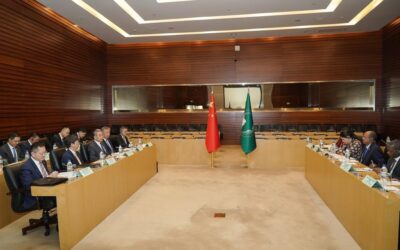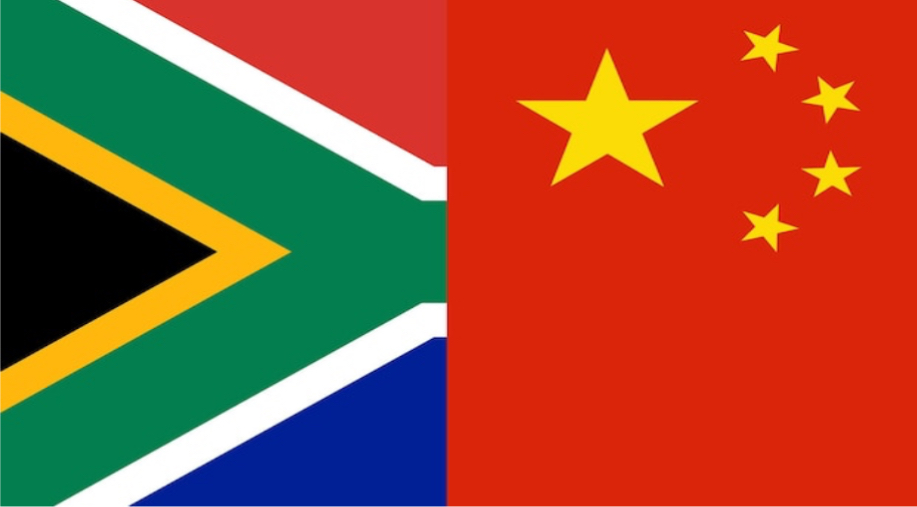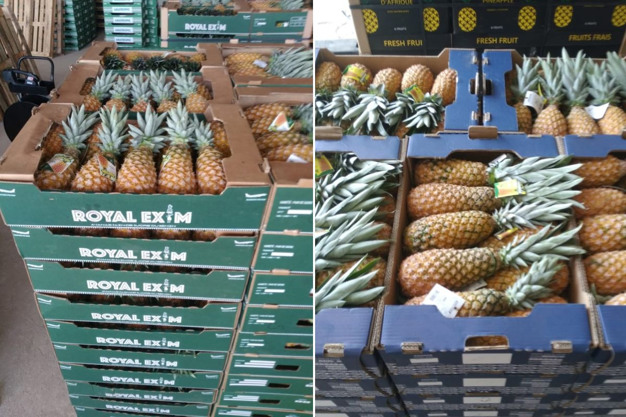By Karabo Mohamme
In a powerful affirmation of growing economic cooperation, South Africa and China have reinforced their strategic partnership with the signing of several key memoranda of understanding (MoUs) during the ninth South Africa-China Trade and Investment Promotion Conference held on Sept. 23.
The conference, a cornerstone of bilateral engagement, resulted in agreements across a range of sectors, demonstrating both countries’ commitment to deepening trade relations and mutual investment. Among the highlights was an MoU between Business Unity South Africa (Busa) and the South Africa China Economy and Trade Association (Saceta), which represents over 200 Chinese enterprises operating in South Africa. This agreement aims to boost collaboration and communication between businesses from both countries.
In the mining and industrial sector, South African investment firm Mantengu Mining entered into a strategic cooperation agreement with Chinese multinational SANY for the distribution of heavy equipment. Similarly, the China State Construction Engineering Corporation signed an MoU with local cement producer AfriSam to source construction materials from South Africa, a move seen as promoting local industrial participation.
Chinese Ambassador to South Africa Wu Pengprovided a strong endorsement of bilateral investment, noting that China has invested over $13.2 billion in South Africa in foreign direct investment (FDI), while South African FDI into China stands at $8 billion. These investments have contributed significantly to employment, with more than 26,000 jobs created in South Africa and nearly 9,000 in China.
Major Chinese companies active in South Africa include Hisense, FAW, Sinosteel, Seraphim Solar, and BAIC, while prominent South African firms such as Sasol, Standard Bank, Mondi, Altech, and Onafriq are established in China. Wu highlighted the rapid growth of trade relations over the past decade and noted that further market access is being considered for South African agricultural exports, including stonefruit.
China currently imports 66 categories of agricultural and food products from South Africa annually. Notably, 50 percent of South Africa’s macadamia nuts and 98 percent of its pecan nuts are exported to China, underlining the importance of agriculture in the trade dynamic.
Addressing delegates, Deputy Minister of Trade, Industry and Competition Zuko Godlimpi urged a stronger focus on investment in mining, manufacturing, and infrastructure development. He also highlighted plans for a battery manufacturing corridor in Southern Africa and set an ambitious goal for the upcoming South Africa Investment Conference in March 2026, which aims to exceed $1.2 trillion in investment commitments.
Godlimpi encouraged South African companies to better understand China’s consumer economy and identify opportunities to build innovative capacity. He also called for more active engagement with the Department of Trade, Industry and Competition to explore areas for capacity building, especially by learning from China’s success in technological and manufacturing development.
Chinese firms were lauded for their investment in renewable energy, green hydrogen, infrastructure, logistics, and the digital economy in South Africa. However, both governments stressed the need for greater beneficiation within South Africa to reduce exports of raw materials and increase production of value-added goods.
Wu emphasized the need for change, especially in sectors such as battery production, where South Africa’s mineral wealth could support higher-value industries.
Busa CEO Khulekani Mathe noted that the trade relationship has matured to the point where China is now South Africa’s largest trading partner, and South Africa is China’s largest on the African continent. While he welcomed the progress made, he echoed the call for greater diversification in South African exports to China.
Saceta chairperson Zhang Caoyang highlighted the deepening localization of Chinese enterprises in South Africa, praising their contribution to job creation and social development. He expressed optimism that further large-scale Chinese investments would follow, further solidifying the countries’ economic partnership.
The latest conference and MoU signings mark a new phase in South Africa-China economic relations—one driven by shared growth, industrialization, and long-term strategic alignment.








Der High-Roller Erster Einzahlungsbonus beträgt 100% bis zu
1.500 € + 150 Freispiele. Der Gesamtbonus des Willkommenspaket beträgt 250% bis zu
2.500 € + 500 Freispiele. Der Casino-Ersteinzahlungsbonus
ist nur vor Platzierung von Einsätzen mit der qualifizierenden Einzahlung
gültig. Benutzer, die zuvor eine Echtgeldeinzahlung auf ihr Jokery-Konto getätigt haben oder den Sportbonus für die erste Einzahlung in Anspruch
genommen haben, sind nicht berechtigt, diese
Aktion zu erhalten.
Die Mindesteinzahlung liegt in den meisten Casinos ohne OASIS zwischen Euro.
Alternative E-Wallets bieten jedoch ähnliche Funktionen. Diese Methoden bieten schnelle Einzahlungen und Auszahlungen innerhalb von Stunden. Die Mindesteinzahlungen sind oft niedriger, Limits flexibler
gestaltbar und Kryptowährungen werden häufig als zusätzliche Option angeboten.
Zu guter Letzt müssen wir leider auch anmerken, dass der neue Glücksspielvertrag in Deutschland viele Lottospieler betrifft.
Auch das Pokerspielen war in Deutschland über viele Jahre zwischen der Legalität
und der Illegalität. Mobil könnt ihr unseren Bizzo Casino Erfahrungen nach auch ohne lange Ladezeiten spielen.
However, it is important that you pay close attention to the moves made on your behalf.
We’ve also made it a little easier for you to determine your next move by highlighting each
possible move you can make based on the number appearing on your dice.
Once you’ve familiarized yourself with the basic rules of Backgammon, you’ll soon see
that it’s a relatively easy game. You may also find that you’re able
to make decisions relating to your move much quicker, and without needing to ask for
help. This is because you’ll know exactly what move to make
in order to beat your opponent. Remember, as with any kind of strategy-based game, the more practiced you are, the higher the chances are
of you winning.
From quick loading times to intuitive controls, everything is designed to keep your game running smoothly.
We prioritize a seamless experience, so you can enjoy backgammon without any technical hassles.
Whether you’re looking for a casual game or a competitive
match, you’ll find it here. Our platform ensures that
finding a match is quick and simple, so you can start
playing immediately.
References:
https://blackcoin.co/cocoa-casino-review/
If you roll doubles, stakes are raised as you get the double gameplay moves, meaning you can move one piece of the total
of both dice multiplied by two, or you can move four different checkers, the total of one dice.
Backgammon Online can be played with a simple mouse click, which controls all moves, including dice
rolls and moving your pieces across the board.
The first person to get all their checkers to the home board and remove each checker via dice rolls wins the game.
Each game features two players, each with
15 checkers, on a board consisting of 24 narrow triangles called
points.
Being the first to bear off also means that you need to stand in the way of your opponent as much as possible.
As such, you should avoid leaving a single checker in one place
for too long, as this runs the risk of it being returned to the starting position. Try to secure points near your home board.
When you have made your way around the board (completed one circle), you can begin to
bear off. This means that you and a friend can play from the same phone or computer, simply passing the phone to each other when necessary.
However, the rules for this game are the same as outlined
above.
References:
https://blackcoin.co/best-payid-casinos-in-australia-15-sites-that-accept-payid/
online casino paypal einzahlung
References:
https://www.woosungplating.com
paypal online casinos
References:
https://working.altervista.org/employer/best-paypal-casinos-updated-2025/
You completed some fine points there. I did a search on the theme and found the majority of people will consent with your blog.
Some really interesting info , well written and loosely user pleasant.
Sweet website , super design and style, very clean and utilise pleasant.
Whats Happening i’m new to this, I stumbled upon this I have found It absolutely helpful and it has aided me out loads. I’m hoping to give a contribution & help different customers like its aided me. Good job.
I am no longer positive where you’re getting your information, however good topic. I must spend a while learning much more or working out more. Thanks for magnificent info I used to be on the lookout for this info for my mission.